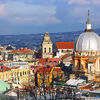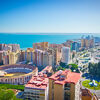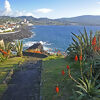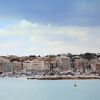26 Nights | World Cruise
About Fort Lauderdale, Florida
You will visit the following 16 places:

Bermuda
Bermuda is a British Overseas Territory in the North Atlantic Ocean, located off the east coast of North America. It is one of the last remains of the once vast British colonial empire in North America. It consists of about 138 islands and islets, with all the major islands aligned on a hook-shaped, but roughly east-west, axis and connected together by road bridges. Despite this complexity, Bermudians usually refer to Bermuda as "the island". Bermuda's pink sand beaches and clear, cerulean blue ocean waters are popular with tourists. Many of Bermuda's hotels are located along the south shore of the island. In addition to its beaches, there are a number of sightseeing attractions. Historic St George's is a designated World Heritage Site. It's most famous visitor attraction is the Royal Naval Dockyard, which includes the Bermuda Maritime Museum. Other attractions include the Bermuda Aquarium, Museum and Zoo, Bermuda Underwater Exploration Institute, the Botanical Gardens and Masterworks Museum of Bermuda Art, lighthouses, and the Crystal Caves with stalactites and underground saltwater pools.

Naples
Naples is a city in Italy; it is the capital of the region of Campania and of the province of Naples. Known for its rich history, art, culture, architecture, music, and gastronomy, Naples has played an important role in the Italian peninsula and beyond for much of its existence, which began more than 2,800 years ago. Situated on the west coast of Italy by the Gulf of Naples, the city is located halfway between two volcanic areas, Mount Vesuvius and the Phlegraean Fields. Naples has the fourth-largest urban economy in Italy, after Milan, Rome and Turin. It is the world's 103rd-richest city by purchasing power, with an estimated 2011 GDP of US$83.6 billion. The port of Naples is one of the most important in Europe, and has the world's second-highest level of passenger flow, after the port of Hong Kong. The city has long been a major cultural centre with a global sphere of influence, particularly during the Renaissance and Enlightenment eras. In the immediate vicinity of Naples are numerous culturally and historically significant sites, including the Palace of Caserta and the Roman ruins ofPompeii and Herculaneum. Culinarily, it is synonymous with pizza, which originated in the city.

Lisbon
The capital of Portugal, Lisbon (Portuguese: Lisboa) has experienced a renaissance in recent years, with a contemporary culture that is alive and thriving and making its mark in today's Europe. Perched on the edge of the Atlantic Ocean, Lisbon is one of the rare Western European cities that faces the ocean and uses water as an element that defines the city. Lisbon enchants travellers with its white-bleached limestone buildings, intimate alleyways, and an easy-going charm that makes it a popular year-round destination.

Málaga
Málaga is a large city in the southern Spanish region of Andalucia and capital of the Malaga Province. The largest city on the Costa del Sol, Malaga has a typical Mediterranean climate and is also known as the birthplace of famous Spanish artist Pablo Picasso. The city offers beaches, hiking, architectural sites, art museums, excellent shopping and cuisine. While more laid back than Madrid or Barcelona, Malaga is still the center and transport hub for the hugely popular Costa del Sol region, which is flooded with tourists in the summer, and the city has certainly cashed in on the sun and sand, with lots of new construction as well as hotels and facilities geared to tourists. However, Malaga also offers some genuinely interesting historical and cultural attractions in its old city and its setting on the coast is still beautiful.

Barcelona
Barcelona – Spain's enchanting capital, second largest and most populous city. It is a huge city that vibrates with life, and there’s certainly not another city in the country to touch it for its sheer style, looks or energy. It is one of the world's leading tourist, economic, trade fair and cultural centers, and its influence in commerce, education, entertainment, media, fashion, science, and the arts all contribute to its status as one of the world's major global cities. Barcelona is home to masterpieces of many great architects – the most famous of which is Antoni Gaudí.

Livorno
Livorno is an Italian port city on the Ligurian Sea, on the western coast of Tuscany, Italy. Traditionally been known in English as Leghorn, it's known for its seafood, Renaissance-era fortifications and modern harbor with a cruise ship port.

Cagliari
Cagliari is an Italian municipality and the capital of the island of Sardinia, an autonomous region of Italy. Cagliari's Sardinian name ''Casteddu'' literally means castle. An ancient city with a long history, Cagliari has seen the rule of several civilisations. Under the buildings of the modern city there is a continuous stratification attesting to human settlement over the course of some five thousand years, from the Neolithic to today. Historical sites include the prehistoric domus de janas, very damaged by cave activity, a large Carthaginian era necropolis, a Roman era amphitheatre, a Byzantine basilica, three Pisan-era towers and a strong system of fortification that made the town the core of Spanish Habsburg imperial power in the western Mediterranean Sea. Its natural resources have always been its sheltered harbour, the often powerfully fortified hill of Monti Castru, the modern Casteddu, the salt from its lagoons, and, from the hinterland, wheat from the Campidano plain and silver and other ores from the Iglesiente mines. Today the city is a regional cultural, educational, political and artistic centre, known for its diverse Art Nouveau architecture and several monuments. It is also Sardinia's economic and industrial hub, having one of the biggest ports in the Mediterranean Sea, an international airport, and the 106th highest income level in Italy (among 8,092 comuni), comparable to that of several northern Italian cities. It is also the seat of the University of Cagliari, founded in 1607, and of the Primate Roman Catholic archdiocese of Sardinia, since the 5th century AD.

Fort Lauderdale
Fort Lauderdale is a city in the U.S. state of Florida, 28 miles (45 km) north of Miami. The city is a popular tourist destination, with an average year-round temperature of 75.5 °F (24.2 °C), and 3,000 hours of sunshine per year. Greater Fort Lauderdale which takes in all of Broward County hosted 12 million visitors in 2012, including 2.8 million international visitors. The district has 561 hotels and motels comprising nearly 35,000 rooms. Greater Fort Lauderdale has over 4,000 restaurants, 63 golf courses, 12 shopping malls, 16 museums, 132 nightclubs, 278 parkland campsites, and 100 marinas housing 45,000 resident yachts. Fort Lauderdale is named after a series of forts built by the United States during the Second Seminole War. The forts took their name from Major William Lauderdale (1782–1838), younger brother of Lieutenant Colonel James Lauderdale. William Lauderdale was the commander of the detachment of soldiers who built the first fort.

Sorrento
Sorrento Neapolitan: Surriento is a town overlooking the Bay of Naples in Southern Italy. A popular tourist destination, it can be reached easily from Naples and Pompeii as it is at the south-eastern end of the Circumvesuviana rail line. The Sorrentine Peninsula has views of Naples, Vesuvius and the Isle of Capri. The Amalfi Drive, connecting Sorrento and Amalfi, is a narrow road that threads along the high cliffs above the Tyrrhenian Sea.

Ponta Delgada
Ponta Delgada is the largest municipality and administrative capital of the Autonomous Region of the Azores in Portugal. It is located on São Miguel Island, the largest and most populous in the archipelago. Cruise ships on repositioning voyages between North America and Europe often call there. Cruise-ship visitors to Ponta Delgada will often drive out into the countryside for visits to small villages and natural volcanic wonders. There's usually time afterward for a relaxed amble through the lovely port city, noted for its squares paved with black and white tiles, fabulous churches, and public buildings with their white-painted facades and brown-black volcanic stone trim. Given its dimension and the diversity of facilities and services it offers, Ponta Delgada is also the place for experiencing, a true gateway to the active discovery of the Azores Archipelago, with many things to do.

Monte Carlo
Monte Carlo, officially refers to an administrative area of the Principality of Monaco, specifically the ward of Monte Carlo/Spélugues, where the Monte Carlo Casino is located. Monaco has four traditional quarters - from west to east they are: Fontvieille (the newest), Monaco-Ville (the oldest), La Condamine, and Monte Carlo. Monte Carlo (literally "Mount Charles") is situated on a prominent escarpment at the base of the Maritime Alps along the French Riviera. Near the western end of the quarter is the world-famous Place du Casino, the gambling center which has made Monte Carlo "an international byword for the extravagant display and reckless dispersal of wealth". It is also the location of the Hôtel de Paris, the Café de Paris, and the Salle Garnier (the casino theatre which is the home of the Opéra de Monte-Carlo).

Menorca
Menorca from Latin: Insula Minor, later Minorica "smaller island" is one of the Balearic Islands located in the Mediterranean Sea belonging to Spain. Its name derives from its size, contrasting it with nearby Majorca. Minorca has a population of approximately 94,383 (2010). It is located 39°47' to 40°00'N, 3°52' to 4°24'E. Its highest point, called El Toro or Monte Toro, is 358 metres (1,175 feet) above sea level.

Cadiz

Horta

Civitavecchia
Civitavecchia is a town and comune of the Metropolitan City of Rome in the central Italian region of Lazio. A sea port on the Tyrrhenian Sea, the name ''Civitavecchia'' means "ancient town". The modern city was built over a pre-existing Etruscan settlement. The massive Forte Michelangelo was first commissioned from Donato Bramante by Pope Julius II, to defend the port of Rome. The upper part of the "maschio" tower, however, was designed by Michelangelo, whose name is generally applied to the fortress. North of the city at Ficoncella are the Terme Taurine baths frequented by Romans and still popular with the Civitavecchiesi. The modern name stems from the common fig plants among the various pools. And also next to the town is the location of the cruise ship docks. All major cruise lines start and end their cruises at this location, and others stop for shore excursion days that allow guests to see Rome and Vatican sights, which are ninety minutes away.











